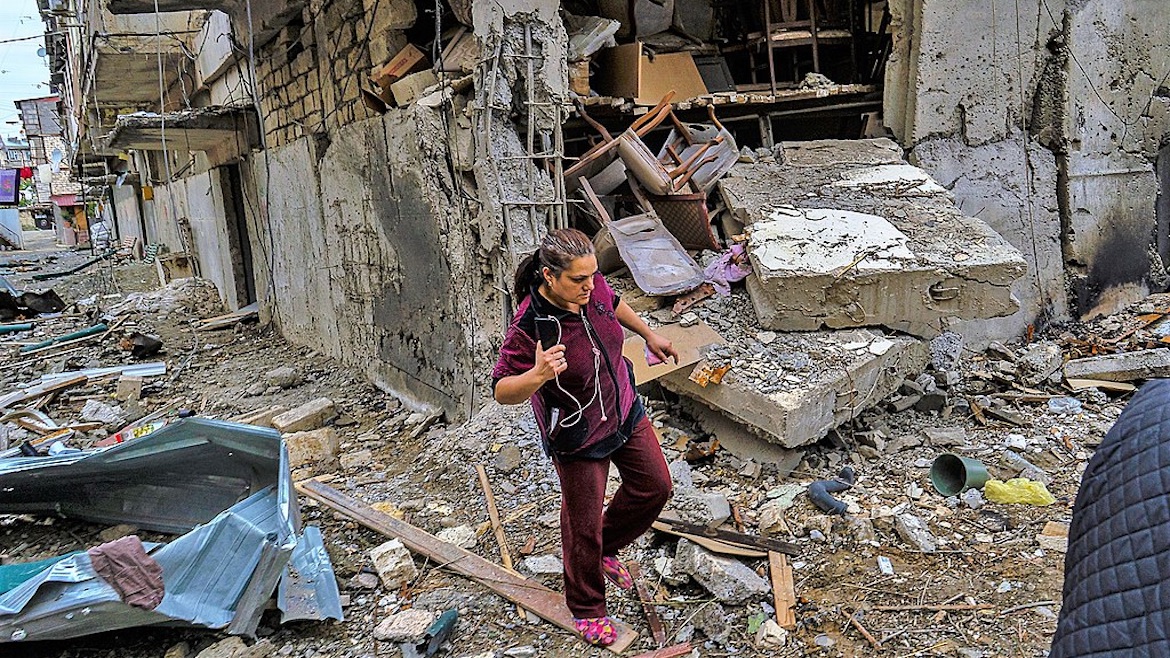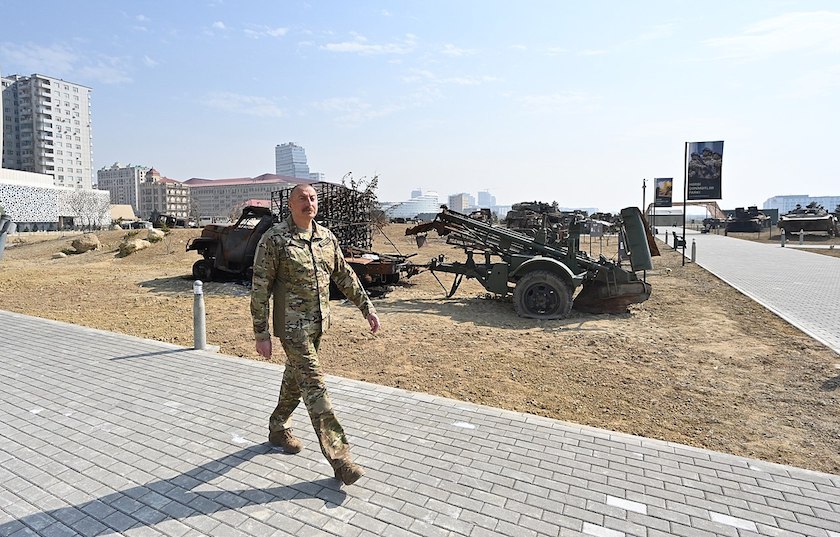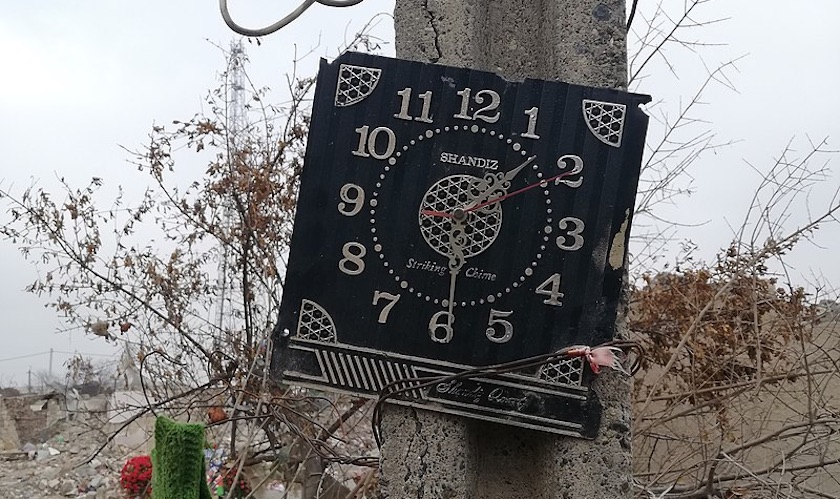Nearly a hundred people have been killed in recent days after the military confrontation between the two countries resumed.
 A woman walks among ruins in a village in the Republic of Artsakh bombed by Azerbaijan, October 2020. / Yan Boechat, VOA, Wikimedia Commons.
A woman walks among ruins in a village in the Republic of Artsakh bombed by Azerbaijan, October 2020. / Yan Boechat, VOA, Wikimedia Commons.
At least 49 Armenian and 50 Azeri military personnel have been killed since the ceasefire agreement in the disputed region of Nagorno-Karabakh, on the border between the two countries, broke down three days ago, on Monday 12 September.
In 2020, a new chapter of the conflict ended with more than 6,500 dead and Azerbaijan’s occupation of the majority of this mainly Armenian-inhabited territory.
Yerevan accuses Azerbaijan of shelling Armenian villages near the border, such as Goris and Vardenis, where at least three civilians have been wounded. Although Russia announced a ceasefire between the two countries early on Tuesday following emergency mediation, Armenian Prime Minister Nikol Pashinian said that “Azerbaijani attacks continue in a couple of directions”. In a speech in the Armenian Parliament, Pashinian recalled that there is a document in force, also signed by Azerbaijan, which guarantees the free movement of goods and people between Armenia and the territory of Nagorno-Karabakh.
In addition to accusing the neighbouring country, Pashinian also raised the threat to a national security issue. “Azerbaijan has launched an offensive operation against the Republic of Armenia [...] and is trying to present these actions as a response to a provocation on our part”, he added.
Azerbaijan, which controls the territory as a result of the last confrontation in 2020, speaks of “large-scale subversive acts” by Armenians and claims that some of its military positions “were attacked, including with mortars [...] and there are losses of personnel and damage to military infrastructure”.
The new confrontation comes barely two weeks after Pashinian and Azerbaijani President Ilham Aliyev met in Brussels at the invitation of European Council President Charles Michel to negotiate a long-term peace process.
For the director of the World Evangelical Alliance’s Peace and Reconciliation Network in Yerevan, Craig Simonian, one cannot speak of two parties “equally to blame” for the breakdown of the 2020 ceasefire, but points the finger at Azerbaijan. “Ultimately, the aim here is two-fold. The first comes down to a customs-free corridor through Armenia that would link Turkey and Azerbaijan. Both Erdogan and Aliyev have continued to demand this. Secondly, Azerbaijan has embarked on a campaign to prove that many of our Armenian cities and towns, within the sovereign borders of Armenia, are historically Azeri. There is simply no evidence to back that up”, considers Simonian.
While there had been constant incidents both in Nagorno-Karabakh and along the Armenia-Azerbaijan border since 2020, this latest attack shakes the agreement reached two years ago, in part because of the war in Ukraine, which keeps the attention of Russia (Armenia’s ally) away from the Caucasus. “Azerbaijan assumes that Russian forces will let them operate since most of them are occupied with Ukraine”, says Johannes Reimer, director of Public Affairs for the World Evangelical Alliance and also director general of the World Evangelical Alliance's Peace and Reconciliation Network.
In this respect, Simonian agrees, stressing that Yerevan's view of the new escalation is that it is a pretext “now that Russia and their peacemaking mission here in Armenia and Artsakh is distracted by the conflict in Ukraine”.

[photo_footer] Azeri President Ilham Aliyev, in military uniform, inaugurating the Military Trophy Park, where various Armenian army equipment was deposited, in April 2021. / President, Wikimedia Commons. [/photo_footer] “The primary impact of the war in Ukraine is the fact that Russia would unlikely want to open a second front by engaging Turkey and Azerbaijan militarily. And yet, Armenia and Russia are both part of the CSTO (Collective Security Treaty Organization) Permanent Council, which is a council of six member states committed to protecting one another’s sovereign borders were they ever to be invaded”, says Simonian. In fact, Armenia has already requested military assistance from this body, which also includes Belarus, Kazakhstan, Kyrgyzstan, and Tajikistan.
International reactions coincide with the magnitude of the urgency that the new military confrontation has aroused, especially in Armenia. They see the new escalation as a sign of what they see as Azerbaijan’s intentions that go beyond Nagorno-Karabakh. Indeed, they argue that their history is at stake.
“While the previous two wars centered around the disputed Artsakh region, which was made, by Stalin, an independent oblast within Azerbaijan (as part of his divide and conquer strategy to weaken the 14 non-Russian Republics within the USSR), this attack is a proper attack against Armenia”, writes Simonian from Yerevan. “Following the dismantling of the Soviet Union, the Supreme Soviet provided the provisions by which Soviet Republics could declare their independence. But they also provided similar provisions for how independent oblasts might also declare independence from the Republics in whom they had been assigned. And so, with the fall of the Soviet Union, the Armenian government of Artsakh has every right to declare its independence from Azerbaijan. However, that declaration was rejected and war ensued, with Armenia fighting alongside the people of Artsakh. But, again, this attack is being waged against Armenia itself with the aim of taking land and the natural resources that comes with it”.
In this regard, Simonian considers the tone of international reactions to be key. “I think that Azerbaijan and Turkey [an ally of Azerbaijan] are waiting to see what the international reaction will be”, he says, “if its seems that it is all talk and no substantive action, I believe that Turkey and Azerbaijan will take land from Armenia and perhaps even half of Lake Sevan, which they’ve spoken about in recent days”.
Russia, which had 2,000 troops deployed in Nagorno-Karabakh as a peacekeeping mission, claims that the dispute “should be resolved exclusively through diplomatic and political means”, while Turkish Foreign Minister Mevlut Cavusoglu said that “Armenia should cease its provocations and focus on peace negotiations”. US Secretary of State Antony Blinken also underlined the White House's rejection of “a military solution to the conflict”.
Thousands of dead and tens of thousands of wounded are the most visible wound of a conflict that has dragged on since 1991. The consequences of renewed fighting, says Reimer, “would be devastating for the Armenian population, who would have to leave their homes and seek refuge in other parts of the country”.
“The prospect of another war, even the more than fifty lost today, is tremendously painful”, says Simonian from Yerevan. Asked how evangelical churches are experiencing this new situation on Armenian territory, the regional director of the World Evangelical Alliance’s Peace and Reconciliation Network says that, “so, not having any control over the circumstances, the Church can do the only thing that can really make a difference at this point. And that is to pray”.
Simonian also regrets that disinformation may be causing Christians in Azerbaijan (just over 4% of the population) “praying according to the false information they are receiving... that God would stop Armenian aggression”. “That adds to our sadness, of course. Those who are genuine Christians here don’t wish for any Muslim Azeri to die. But we do pray that God would sustain our sovereign borders and end this conflict as soon as possible”, he adds.

[photo_footer] A clock hangs from a column in the hard-hit city of Ganja in 2020. / Javid Nabizade, Wikimedia Commons. [/photo_footer] While diplomatic negotiations for the peace process seem increasingly unlikely, evangelicals in Armenia appeal to the elements of “truth”, referring to the revision of history, and “love”, referring to relations between countries, to overcome the Nagorno Karabakh conflict. However, the wound is still open, and this is also perceived in the discourse. “Azeris will always continue their hatred of Armenia and Armenians, something they are taught from the time they enter public school, as long as Aliyev and his government continues to feed their people lies about Armenia”, says Simonian.
“The idea that a nation of 3 million, with an exponentially smaller army and far more outdated army may face by the 103 million Azeri and Turks is simply insane. No one in Armenia believes we can win a war against Turkey and so no one would try to instigate one”, he adds. “However, Armenians are brave and valiant... and, if they have to, they will defend their land the best they can”, he concludes.
[donate]

Las opiniones vertidas por nuestros colaboradores se realizan a nivel personal, pudiendo coincidir o no con la postura de la dirección de Protestante Digital.
Si quieres comentar o